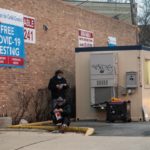The exodus back to the office is underway — though many workers won’t be saying goodbye to their home offices anytime soon.
With COVID restrictions lifting, some Colorado Springs employers have welcomed workers back to their offices in the past few weeks and several others are getting ready to reopen offices this summer, a Gazette survey of some major employers shows.
Many local office-based employers sent the bulk of their workforce home in mid-March 2020 as the COVID-19 pandemic was triggering widespread business closures and soon a statewide stay-at-home order. That left downtown Colorado Springs and many office parks with a much smaller daytime population as a large percentage of office employees worked remotely for the past 15 months.
The Downtown Partnership estimated that remote work reduced the downtown workforce by more than half to about 4,000-6,000 during the worst of the pandemic last spring and again in the winter. While more workers have returned to the office in recent weeks, only about half of downtown’s typical workforce has returned and many employees are in the office for only a day or two a week.
“I believe we will see an uptick in the number of people working downtown during the daytime by the end of June,” Downtown Partnership CEO Susan Edmondson said. “I don’t think anything will go back to the way it was pre-pandemic because everything is being reexamined right now. Employers have added a lot more flexibility for where employees work and it would be wrong to expect it to return to exactly the way it was.”
Several high-profile employers both downtown and in other locations around the city, however, are beginning to return to the office or planning a return. Automotive software developer Altia, defense contractors Bluestaq and Boecore, financial giant Ent Credit Union and online commerce software developer Quantum Metric all have told employees they can return to the office in recent weeks. Insurers USAA and Progressive, video email provider BombBomb and financial giant Wells Fargo are preparing to bring employees back later this summer, while Junior Achievement and defense contractors Lockheed Martin and Parsons are allowing many employees to continue to work remotely.
“Our employees were able to work from home throughout the pandemic, and were able to maintain productivity and get good results. But we do benefit from the time we are able to be together and collaborate,” said Mike Juran, founder and CEO of Colorado Springs-based Altia, which told its 100 employees here and in Detroit, Seoul, Tokyo and Frankfurt, Germany, they could return to the office June 7. “We will have core days on Tuesday through Thursday for collaboration and those who want to return five days a week can (do so). We’ll see where the next couple of months go — this is a bit of a trial period.”
Just eight of Altia’s employees chose to continue working entirely remotely, in consultation with their managers, who determined the best work arrangement for their team, Juran said. Altia employees in Detroit work in offices of major auto manufacturers that use Altia software to design dashboard and entertainment system displays in their vehicles. A handful of Altia employees returned to the company’s office in the downtown Plaza of the Rockies building earlier this year.
“Our (return-to-the-office) plan was all centered around (COVID-19) vaccine availability. Everyone who wants one now can get it and we are now at the point most of our employees — more than 80% — have both vaccinations, based on an anonymous survey,” Juran said. “There was a lot of interest in coming back to the office with all the new restaurants and the new soccer stadium. I think the death of the office is overstated — not only will it come back, it will come back stronger than ever.”
About 90% of Ent Credit Union’s employees had returned to the office by March, and management asked remaining employees to return to their offices June 1. Employees who wanted to continue working remotely could do so two days a week and work three days a week in the office with manager approval. Ent also dropped mask requirements for vaccinated employees in mid-May, but recommended that unvaccinated workers continue wearing masks.
Quantum Metric began bringing its employees back to its northern Colorado Springs and Denver offices in late May, but only a handful have returned to work there, said CEO Mario Ciabarra. However, much of the company’s 300-person workforce has always worked remotely and Ciabarra said that won’t change once the pandemic is over, although the company opened a Chicago office at its employees’ request and is also is seeking office space in Boston and London.
“We will never tell people that they must come into the office, but we provide space for teams who want to be in the office. Maybe they need to escape to a place where they can concentrate,” Ciabarra said. “Office space is a spot to collaborate and meet with other team members. Any employee who wants to go to the office can do so at their own choice and comfort level. But working remotely is a way to avoid a long commute to the office, and I think people enjoy that.”
Ciabarra believes more of Quantum’s employees will return to its offices over time but it will take a while for a “critical mass” of office-based employees to develop.
Formstack, which develops online forms as well as document generation and electronic signature software from offices in downtown Colorado Springs, Denver and Indiana, also has a majority of its staff working remotely. The company reopened its offices in March but limited capacity to 15 people. While it lifted that cap this month, fewer than 10 are working in the office — though that number is expected to increase, said Ryan Grieves, a company spokesman.
Bluestaq and Boecore returned to their offices June 14. Bluestaq Chief Operating Officer Rebecca Decker said the company asked all of its 66 employees to return to the office, giving them about two months notice to get vaccinated, though shots are not required, and arrange for child care if needed. Bluestaq also allows any employee to work from home or remotely on Wednesday, and work a flexible schedule that day.
“People want to be in the office; they are craving it,” Decker said. “You can tell employees are starting to return to the office downtown; I had to wait in line today at (a nearby) Starbucks for the first time in more than a year.”
Boecore celebrated bringing its employees back to the office in the Wells Fargo Tower by treating them at the nearby U.S. Olympic and Paralympic Museum’s Flame Café. Company CEO Kathy Boe said some of the company’s 275 employees based at its Colorado Springs corporate headquarters and offices in Albuquerque, N.M., and Huntsville, Ala., are still working remotely with a manager’s approval.
“Some have continued to work from home, but most are back in the office,” Boe said. “We hired 70 people between the time we left the office on March 16, 2020, and when we returned, so most had never worked in our offices before our return. Our people make our business successful, so we believe flexibility makes it a better work environment. “
BombBomb said in a statement that the video email company plans to open its offices in the Wells Fargo Tower in August, but many employees who worked exclusively in the office will work a hybrid schedule split between their home and office when they return. Ethan Beute, BombBomb’s chief evangelist, said some of the details of the company’s return-to-the-office plan remain tentative.
Edmondson, the Downtown Partnership CEO, believes the city’s primary business hub will thrive as the pandemic ends because even if employees are only in the office two or three days a week, they will still eat at downtown restaurants and visit downtown shops on those days. She also noted downtown was not overbuilt before the pandemic hit, so even if employers reduce the space they occupy, downtown office vacancies aren’t likely to surge.
“Employees need to interact with others to be successful. Much of business is done by relationships and downtown is where business relationships are made,” Edmondson said.
Outside of the downtown area, insurers USAA and Progressive are preparing to bring employees back to their northern Colorado Springs offices. Both operate local customer service centers and Progressive also has a data center and major information technology operation on its Northgate campus. Meanwhile, most of the workers at telecommunications giant T-Mobile’s call center continue to work from home while the company continues to monitor pandemic conditions.
Jeff Sibel, a Progressive spokesman, said work is underway to prepare its offices in the Springs and across the country to open, including setting up work stations for its 7,500 new hires and 5,000 employees who have been promoted. But the company has told employees at its call centers they can continue to work from home indefinitely and told all other employees they can “work where they’re most comfortable” for the rest of the year.
USAA is giving employees the choice, depending on their job, to work solely at its offices, work entirely at home or a hybrid model of working some days from the office and others from home, spokeswoman Laura Propp said. USAA started shifting to the three options in May with its executives and is phasing it in with the rest of its staff this month through early July. The company is not requiring COVID-19 vaccines, but it is encouraging employees to get the shot and is giving them time off to get vaccinated.
Wells Fargo plans to return “a more normal operating model” in September, soon after Labor Day, said Tony Timmons, a company spokesman for its Colorado, Idaho, Nevada and Utah operations. The banking giant is still determining what that model will look like but is not taking a one-size-fits-all approach, though management believes “most of us benefit by being physically together,” he said.
Defense contractors Lockheed Martin and Parson continue to allow employees to work remotely, based on the type of work they do. A Lockheed statement said the company continues to monitor “steps taken by federal, state and local offices to minimize the spread of coronavirus.” Parsons said in its statement that it recognizes that “many of our employees can work productively from almost anywhere,” so it has accommodated those who have returned to the office and those who work remotely in consultation with their managers.
Junior Achievement hasn’t returned to its national headquarters office south of downtown, and its employees will continue to work remotely as the business education nonprofit tries to sell its 35,000-square-foot building and move to a smaller building, said Ed Grocholski, the group’s senior vice president of brand.
This content was originally published here.





